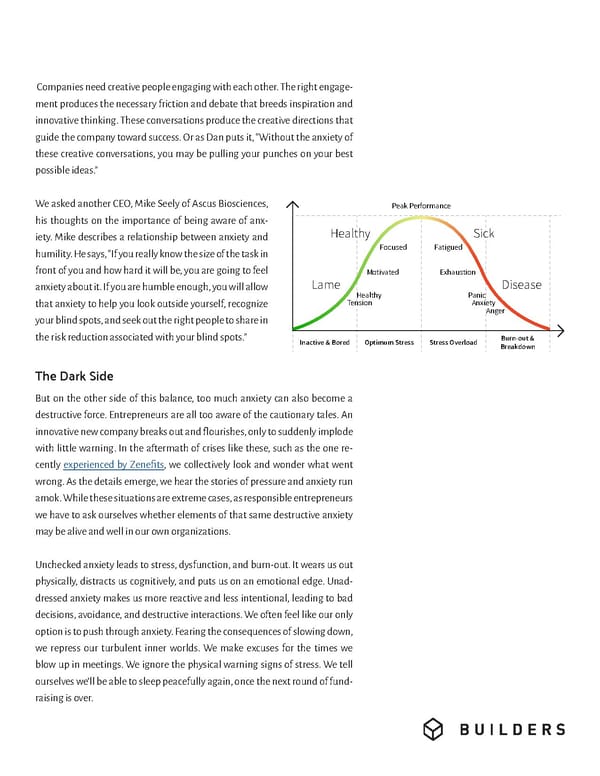Companies need creative people engaging with each other. The right engage- ment produces the necessary friction and debate that breeds inspiration and innovative thinking. These conversations produce the creative directions that guide the company toward success. Or as Dan puts it, “Without the anxiety of these creative conversations, you may be pulling your punches on your best possible ideas.” We asked another CEO, Mike Seely of Ascus Biosciences, Peak Performance his thoughts on the importance of being aware of anx- iety. Mike describes a relationship between anxiety and Healthy Sick humility. He says, “If you really know the size of the task in Focused Fatigued front of you and how hard it will be, you are going to feel Motivated Exhaustion anxiety about it. If you are humble enough, you will allow Lame Disease Healthy Panic that anxiety to help you look outside yourself, recognize Tension Anxiety your blind spots, and seek out the right people to share in Anger the risk reduction associated with your blind spots.” Inactive & Bored Optimum Stress Stress Overload Burn-out & Breakdown The Dark Side But on the other side of this balance, too much anxiety can also become a destructive force. Entrepreneurs are all too aware of the cautionary tales. An innovative new company breaks out and flourishes, only to suddenly implode with little warning. In the aftermath of crises like these, such as the one re- cently experienced by Zenefits, we collectively look and wonder what went wrong. As the details emerge, we hear the stories of pressure and anxiety run amok. While these situations are extreme cases, as responsible entrepreneurs we have to ask ourselves whether elements of that same destructive anxiety may be alive and well in our own organizations. Unchecked anxiety leads to stress, dysfunction, and burn-out. It wears us out physically, distracts us cognitively, and puts us on an emotional edge. Unad- dressed anxiety makes us more reactive and less intentional, leading to bad decisions, avoidance, and destructive interactions. We often feel like our only option is to push through anxiety. Fearing the consequences of slowing down, we repress our turbulent inner worlds. We make excuses for the times we blow up in meetings. We ignore the physical warning signs of stress. We tell ourselves we’ll be able to sleep peacefully again, once the next round of fund- raising is over.
 Healthy Stress - Unlocking The Power Of Anxiety Page 2 Page 4
Healthy Stress - Unlocking The Power Of Anxiety Page 2 Page 4